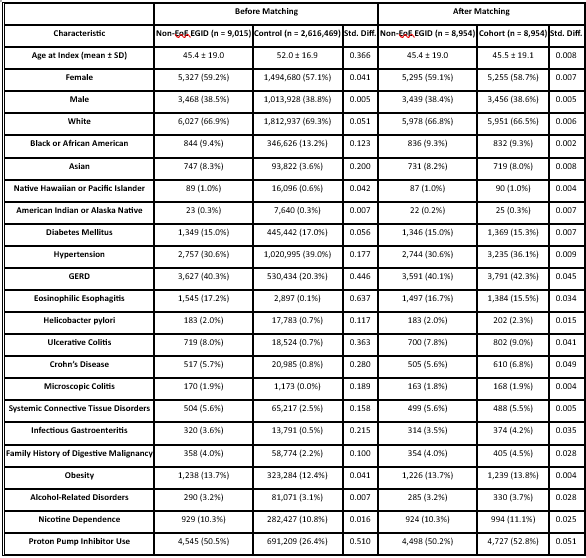Tuesday Poster Session
Category: Small Intestine
P6210 - Cancer and Complication Risk in Non-Eosinophilic Esophagitis Eosinophilic GI Disorders: A Propensity Score-Matched Cohort Study
Tuesday, October 28, 2025
10:30 AM - 4:00 PM PDT
Location: Exhibit Hall
- MM
Muhammad Hassaan Arif Maan, MBBS
Rutgers New Jersey Medical School
Newark, NJ
Presenting Author(s)
Muhammad Hassaan Arif Maan, MBBS1, Soban Maan, MBBS2, Muhammad Mursaleen Ahmad, MBBS3, Imran Qureshi, MD1, Ritik M. Goyal, MBBS1, Ethan Shamsian, MD1, Rohan Karkra, MBBS1, Menna-Allah Elaskandrany, DO4, Sunnia Khan, MBBS5, Kaveh Hajifathalian, MD1, Ahmed Al-Khazraji, MD1
1Rutgers New Jersey Medical School, Newark, NJ; 2West Virginia University School of Medicine, Morgantown, WV; 3Pakistan Institute of Medical Sciences, Shaheed Zulfiqar Ali Bhutto Medical University, Islamabad, Islamabad, Pakistan; 4Lenox Hill Hospital, Northwell Health, New York, NY; 5Punjab Medical College, Faisalabad, Punjab, Pakistan
Introduction: Non-eosinophilic esophagitis gastrointestinal disorders (Non-EoE EGIDs), including eosinophilic gastroenteritis (EGE) and eosinophilic colitis (EC), are rare immune-mediated eosinophilic inflammatory diseases. Chronic inflammation is implicated in carcinogenesis, yet the long-term malignancy risk in Non-EoE EGIDs remains unclear.
Methods: We performed a multicenter retrospective cohort study using the TriNetX electronic health records database. Adults ( >18 years) diagnosed with EGE or EC constituted the study cohort, matched 1:1 with controls lacking these diagnoses. Exclusion criteria included prior gastrointestinal malignancy. Propensity score matching adjusted for demographics and comorbidities, including eosinophilic esophagitis, Helicobacter pylori gastritis, inflammatory bowel disease, connective tissue disease, infectious gastroenteritis, family history of GI malignancy, obesity, alcohol, and tobacco use. Primary outcome was composite gastrointestinal malignancy incidence; secondary outcomes included site-specific cancers and gastrointestinal complications.
Results: We performed a multicenter retrospective cohort study using the TriNetX electronic health records database. Adults ( >18 years) diagnosed with EGE or EC constituted the study cohort, matched 1:1 with controls lacking these diagnoses. Exclusion criteria included prior gastrointestinal malignancy. Propensity score matching adjusted for demographics and comorbidities, including eosinophilic esophagitis, Helicobacter pylori gastritis, inflammatory bowel disease, connective tissue disease, infectious gastroenteritis, family history of GI malignancy, obesity, alcohol, and tobacco use. Primary outcome was composite gastrointestinal malignancy incidence; secondary outcomes included site-specific cancers and gastrointestinal complications.
Discussion: Non-EoE EGIDs, especially EGEs, are associated with a significantly increased risk of gastrointestinal malignancies and obstructive complications. These findings highlight the urgent need for further research to elucidate clinical outcomes and optimize management strategies in these rare but potentially high-risk disorders.

Figure: Baseline Characteristics Before and After Propensity Score Matching
Disclosures:
Muhammad Hassaan Arif Maan indicated no relevant financial relationships.
Soban Maan indicated no relevant financial relationships.
Muhammad Mursaleen Ahmad indicated no relevant financial relationships.
Imran Qureshi indicated no relevant financial relationships.
Ritik M. Goyal indicated no relevant financial relationships.
Ethan Shamsian indicated no relevant financial relationships.
Rohan Karkra indicated no relevant financial relationships.
Menna-Allah Elaskandrany indicated no relevant financial relationships.
Sunnia Khan indicated no relevant financial relationships.
Kaveh Hajifathalian indicated no relevant financial relationships.
Ahmed Al-Khazraji indicated no relevant financial relationships.
Muhammad Hassaan Arif Maan, MBBS1, Soban Maan, MBBS2, Muhammad Mursaleen Ahmad, MBBS3, Imran Qureshi, MD1, Ritik M. Goyal, MBBS1, Ethan Shamsian, MD1, Rohan Karkra, MBBS1, Menna-Allah Elaskandrany, DO4, Sunnia Khan, MBBS5, Kaveh Hajifathalian, MD1, Ahmed Al-Khazraji, MD1. P6210 - Cancer and Complication Risk in Non-Eosinophilic Esophagitis Eosinophilic GI Disorders: A Propensity Score-Matched Cohort Study, ACG 2025 Annual Scientific Meeting Abstracts. Phoenix, AZ: American College of Gastroenterology.
1Rutgers New Jersey Medical School, Newark, NJ; 2West Virginia University School of Medicine, Morgantown, WV; 3Pakistan Institute of Medical Sciences, Shaheed Zulfiqar Ali Bhutto Medical University, Islamabad, Islamabad, Pakistan; 4Lenox Hill Hospital, Northwell Health, New York, NY; 5Punjab Medical College, Faisalabad, Punjab, Pakistan
Introduction: Non-eosinophilic esophagitis gastrointestinal disorders (Non-EoE EGIDs), including eosinophilic gastroenteritis (EGE) and eosinophilic colitis (EC), are rare immune-mediated eosinophilic inflammatory diseases. Chronic inflammation is implicated in carcinogenesis, yet the long-term malignancy risk in Non-EoE EGIDs remains unclear.
Methods: We performed a multicenter retrospective cohort study using the TriNetX electronic health records database. Adults ( >18 years) diagnosed with EGE or EC constituted the study cohort, matched 1:1 with controls lacking these diagnoses. Exclusion criteria included prior gastrointestinal malignancy. Propensity score matching adjusted for demographics and comorbidities, including eosinophilic esophagitis, Helicobacter pylori gastritis, inflammatory bowel disease, connective tissue disease, infectious gastroenteritis, family history of GI malignancy, obesity, alcohol, and tobacco use. Primary outcome was composite gastrointestinal malignancy incidence; secondary outcomes included site-specific cancers and gastrointestinal complications.
Results: We performed a multicenter retrospective cohort study using the TriNetX electronic health records database. Adults ( >18 years) diagnosed with EGE or EC constituted the study cohort, matched 1:1 with controls lacking these diagnoses. Exclusion criteria included prior gastrointestinal malignancy. Propensity score matching adjusted for demographics and comorbidities, including eosinophilic esophagitis, Helicobacter pylori gastritis, inflammatory bowel disease, connective tissue disease, infectious gastroenteritis, family history of GI malignancy, obesity, alcohol, and tobacco use. Primary outcome was composite gastrointestinal malignancy incidence; secondary outcomes included site-specific cancers and gastrointestinal complications.
Discussion: Non-EoE EGIDs, especially EGEs, are associated with a significantly increased risk of gastrointestinal malignancies and obstructive complications. These findings highlight the urgent need for further research to elucidate clinical outcomes and optimize management strategies in these rare but potentially high-risk disorders.

Figure: Baseline Characteristics Before and After Propensity Score Matching
Disclosures:
Muhammad Hassaan Arif Maan indicated no relevant financial relationships.
Soban Maan indicated no relevant financial relationships.
Muhammad Mursaleen Ahmad indicated no relevant financial relationships.
Imran Qureshi indicated no relevant financial relationships.
Ritik M. Goyal indicated no relevant financial relationships.
Ethan Shamsian indicated no relevant financial relationships.
Rohan Karkra indicated no relevant financial relationships.
Menna-Allah Elaskandrany indicated no relevant financial relationships.
Sunnia Khan indicated no relevant financial relationships.
Kaveh Hajifathalian indicated no relevant financial relationships.
Ahmed Al-Khazraji indicated no relevant financial relationships.
Muhammad Hassaan Arif Maan, MBBS1, Soban Maan, MBBS2, Muhammad Mursaleen Ahmad, MBBS3, Imran Qureshi, MD1, Ritik M. Goyal, MBBS1, Ethan Shamsian, MD1, Rohan Karkra, MBBS1, Menna-Allah Elaskandrany, DO4, Sunnia Khan, MBBS5, Kaveh Hajifathalian, MD1, Ahmed Al-Khazraji, MD1. P6210 - Cancer and Complication Risk in Non-Eosinophilic Esophagitis Eosinophilic GI Disorders: A Propensity Score-Matched Cohort Study, ACG 2025 Annual Scientific Meeting Abstracts. Phoenix, AZ: American College of Gastroenterology.
